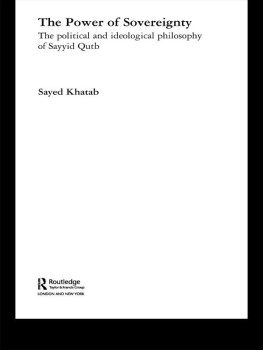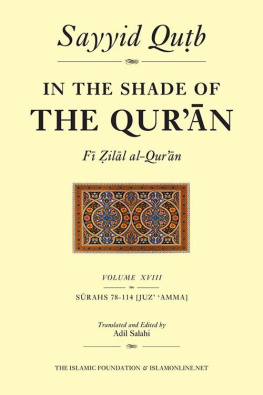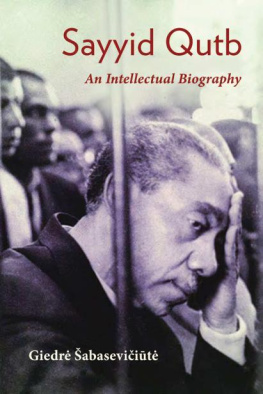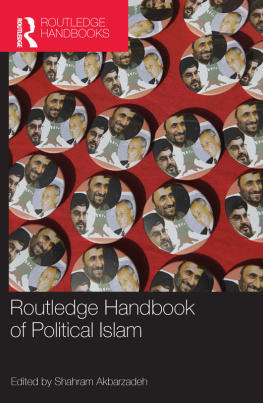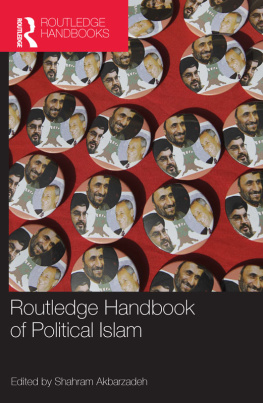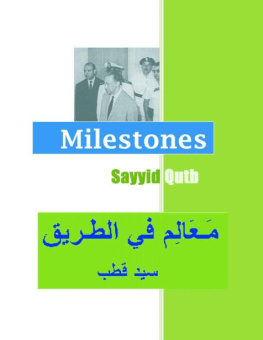Sayed Khatab - The Political Thought of Sayyid Qutb (Routledge Studies in Political Islam)
Here you can read online Sayed Khatab - The Political Thought of Sayyid Qutb (Routledge Studies in Political Islam) full text of the book (entire story) in english for free. Download pdf and epub, get meaning, cover and reviews about this ebook. year: 2006, publisher: Taylor and Francis, genre: Religion. Description of the work, (preface) as well as reviews are available. Best literature library LitArk.com created for fans of good reading and offers a wide selection of genres:
Romance novel
Science fiction
Adventure
Detective
Science
History
Home and family
Prose
Art
Politics
Computer
Non-fiction
Religion
Business
Children
Humor
Choose a favorite category and find really read worthwhile books. Enjoy immersion in the world of imagination, feel the emotions of the characters or learn something new for yourself, make an fascinating discovery.
- Book:The Political Thought of Sayyid Qutb (Routledge Studies in Political Islam)
- Author:
- Publisher:Taylor and Francis
- Genre:
- Year:2006
- Rating:5 / 5
- Favourites:Add to favourites
- Your mark:
- 100
- 1
- 2
- 3
- 4
- 5
The Political Thought of Sayyid Qutb (Routledge Studies in Political Islam): summary, description and annotation
We offer to read an annotation, description, summary or preface (depends on what the author of the book "The Political Thought of Sayyid Qutb (Routledge Studies in Political Islam)" wrote himself). If you haven't found the necessary information about the book — write in the comments, we will try to find it.
Sayed Khatab: author's other books
Who wrote The Political Thought of Sayyid Qutb (Routledge Studies in Political Islam)? Find out the surname, the name of the author of the book and a list of all author's works by series.
The Political Thought of Sayyid Qutb (Routledge Studies in Political Islam) — read online for free the complete book (whole text) full work
Below is the text of the book, divided by pages. System saving the place of the last page read, allows you to conveniently read the book "The Political Thought of Sayyid Qutb (Routledge Studies in Political Islam)" online for free, without having to search again every time where you left off. Put a bookmark, and you can go to the page where you finished reading at any time.
Font size:
Interval:
Bookmark:
Sayyid Qutb
Sayyid Qutb is widely considered an ideologue of the radical Islamist movements in the present world. His writings and, in particular, his theory of jahiliyyah was viewed as a threat to the nationalistic regimes in the Muslim world from Egypt to Tashkent and is now viewed as a threat to the West.
Based on Qutbs own Arabic writings, The Political Thought of Sayyid Qutb explains, along with other ideas of Qutb, the force and intent of the jahiliyyah concept, and explores its development until it became a mature confrontational theory. The issues addressed in this book include
- the political, economic and intellectual specifics that played a substantial role in the development of the jahiliyyah theory
- the role of America in the stages of the theorys development
- Qutbs intellectual life, his political activism and his relation with the British-backed Monarch in Egypt and Nassers Republic
The book sheds light on Islamic radicalism and its intellectual origins by presenting new analysis of the intellectual legacy of one of the most important thinkers of modern Islamic revival. The Political Thought of Sayyid Qutb is essential reading for those with interests in Islam, philosophy and radical Islam.
Dr Sayed Khatab is a researcher in the School of Political and Social Inquiry at Monash University. His research interests focus on politics in the Middle East, and Islamic political thought and movements in the modern world. His publications include Arabism and Islamism in Sayyid Qutbs Thought on Nationalism, The Muslim World, 94, 2 (2004), 217244.
1. The Flourishing of Islamic Reformism in Iran
Political Islamic groups in Iran (194161)
Seyed Mohammad Ali Taghavi
2. The Political Thought of Sayyid Qutb
The theory of jahiliyyah
Sayed Khatab
3. The Power of Sovereignty
The political and ideological philosophy of Sayyid Qutb
Sayed Khatab
Sayyid Qutb

First published 2006
by Routledge
2 Park Square, Milton Park, Abingdon, Oxon OX14 4RN
Simultaneously published in the USA and Canada
by Routledge
270 Madison Ave, New York, NY 10016
Routledge is an imprint of the Taylor & Francis Group
2006 Sayed Khatab
This edition published in the Taylor & Francis e-Library, 2006.
To purchase your own copy of this or any of Taylor & Francis or Routledges collection of thousands of eBooks please go to www.eBookstore.tandf.co.uk.
All rights reserved. No part of this book may be reprinted or reproduced or utilised in any form or by any electronic, mechanical, or other means, now known or hereafter invented, including photocopying and recording, or in any information storage or retrieval system, without permission in writing from the publishers.
British Library Cataloguing in Publication Data
A catalogue record for this book is available
from the British Library
Library of Congress Cataloging in Publication Data
A catalog record for this book has been requested
ISBN 0-415-37596-7

Sayyid Qutb at the Colorado State Teachers College in 1949.
Source: University Archives, University of Northern Colorado.
Note
This photo shows Sayyid Qutb on the right and Dr William R. Ross on the left examining Qutbs Social Justice in Islam, published in Cairo in 1949. This photo appeared in the Colleges 17 October 1949 Bulletin.
History, the wayward child, has forgotten the examples of mother Egypt.
There was an ancient legend in Egypt. When the god of wisdom and knowledge created History, he gave him a great writing book and a big pen, and said to him: Go walking on this earth, and write notes about everything you see or hear.
History went down and did as his god had told him, but sometimes he did not understand some subjects or did not know some things because he was yet young. Then he asked his god who answered every question.
Once History was walking and writing in his great book when, surprised, he saw a beautiful young woman who was a wise woman, too; she had a little boy whom she was teaching in a gentle manner.
History looked at her with great astonishment and cried, Who is it?, raising his face to the sky.
She is Egypt, his god answered. She is Egypt and that little boy is the world who is studyingthe god answered again.
When was she born? History asked.
I dont knowthe god of wisdom and knowledge saidI should ask the headgod.
Oh, sacred chief, when was Egypt born?
I dont rememberreplied the chief godmy grandfather told me a long story about this matter but I dont remember now. You may ask her about it. She knows that. She knows everything. She drank from the sacred Nile and learnt all.
The god of wisdom and knowledge said to History: You are allowed to ask her about her birth and about any other matter you have no knowledge of. Dont ask me anything else. Sit down now to study this lesson, and I will listen.
Why did those ancient Egyptians hold this belief? Because they were very advanced and possessed a great civilization before any other country. Egypt was a civilized country when other peoples were living in forests. Egypt taught Greece, and Greece taught Europe.
What happened when that little boy grew up?
When he grew up, he had thrown out his nurse, his kind nurse! He struck her, trying to kill her. I am sorry. This is not a figure of speech. This is a fact. This is what has actually happened.
When we came here to appeal to England for our rights, the world helped England against the justice. When we came here to appeal against Jews, the World helped the Jews against the justice. During the war between Arabs and Jews, the world helped the Jews, too.
Oh! What an undutiful world! What an undutiful boy!
The world is divided today into two large blocs, the Communist bloc in the East and the Capitalist bloc in the West. That is what appears on the surface, what everybody is saying and thinking. But we believe that it is a superficial division and not a real one, a division based on interests and not on principles, a struggle for goods and markets and not for ideas and convictions.... We should not be deceived by the fact that we see a strong and violent struggle between the Eastern and Western blocs, for both of them have a materialistic notion of life; each is similar to the other in its thinking, and neither struggles for ideas and principles but only for influence in the world and profits in the market. The real and profound struggle is between Islam on one hand and both the Eastern and Western blocs on the other.
(Sayyid Qutb 1949)
It is crystal clear that the real struggle in the future will not be between capitalism and communism and not between the Eastern camp and the Western camp, but it will be between the materialism visible throughout the world and Islam.
(Sayyid Qutb 1949)
To the memory and the souls of my parents,
Font size:
Interval:
Bookmark:
Similar books «The Political Thought of Sayyid Qutb (Routledge Studies in Political Islam)»
Look at similar books to The Political Thought of Sayyid Qutb (Routledge Studies in Political Islam). We have selected literature similar in name and meaning in the hope of providing readers with more options to find new, interesting, not yet read works.
Discussion, reviews of the book The Political Thought of Sayyid Qutb (Routledge Studies in Political Islam) and just readers' own opinions. Leave your comments, write what you think about the work, its meaning or the main characters. Specify what exactly you liked and what you didn't like, and why you think so.


